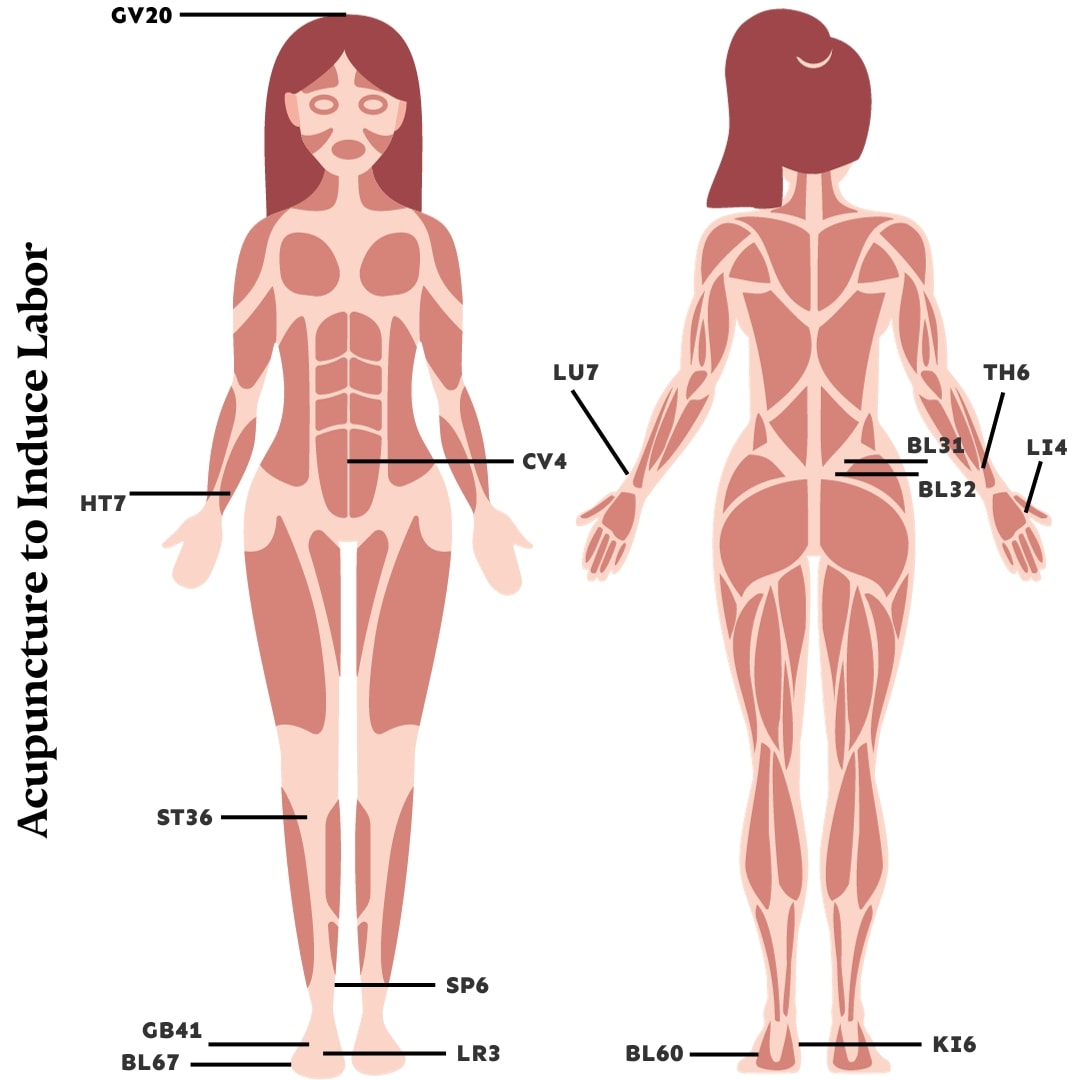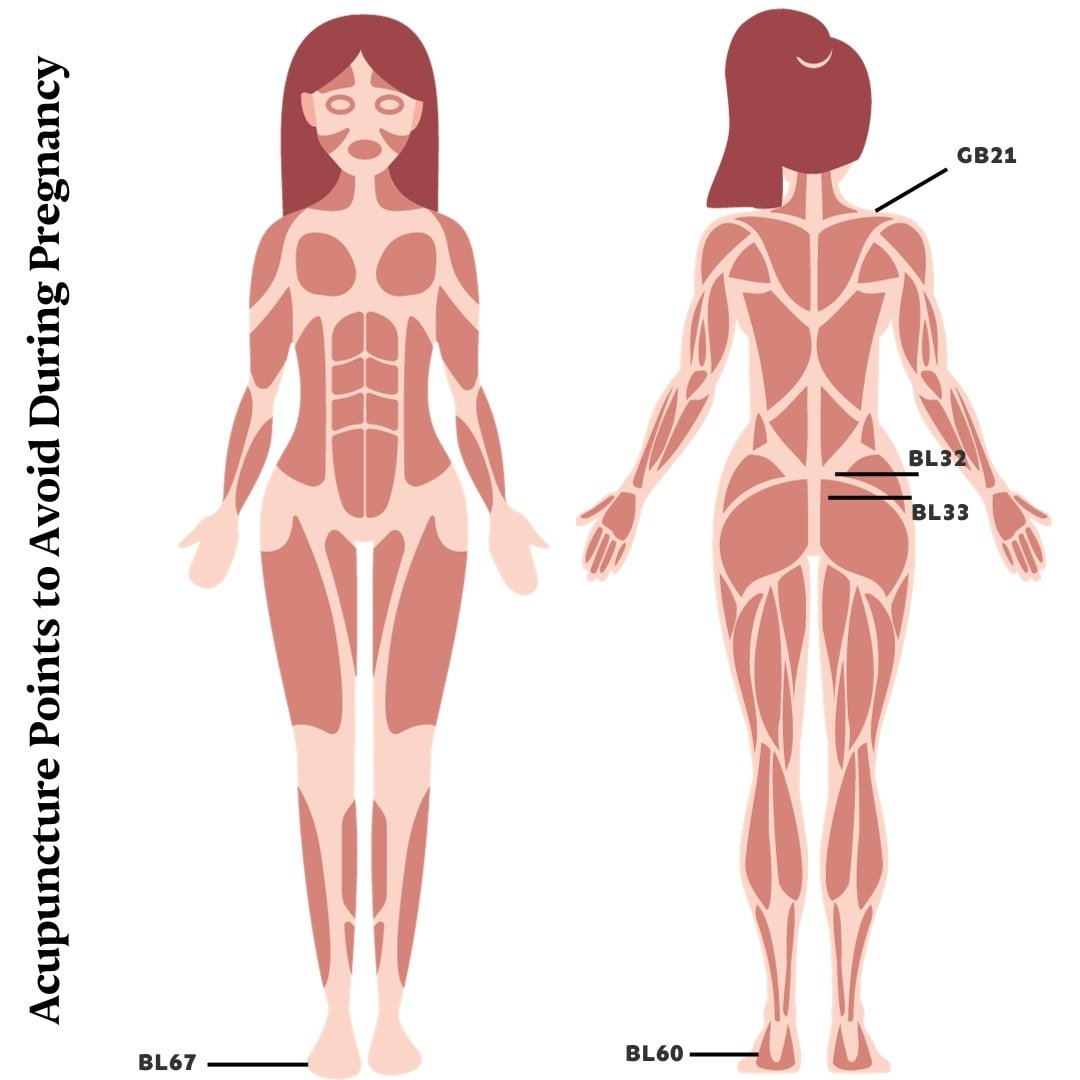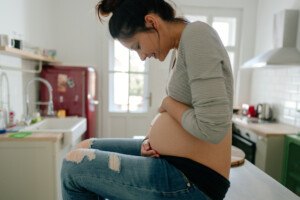Pregnancy has its fair share of aches, pains, and other health concerns and discomforts. Because many common medical treatments can be expensive and may cause side effects to both mom and baby, women and providers are turning toward complementary and alternative treatments to ease discomfort. One of these interventions during pregnancy is acupuncture.
Acupuncture has been used during pregnancy in an attempt to relieve many common pregnancy ailments, such as morning sickness, back pain, and pelvic pain. It has also been trialed for turning a breech baby, pain relief, and the natural induction of labor.1 We will examine acupuncture’s uses, effectiveness, and safety during pregnancy.
What Is Acupuncture?
Acupuncture is a traditional Chinese medicine that balances energy throughout the body to relieve pain and optimize physical and mental health. An acupuncturist inserts very thin needles through the skin into specific points throughout the body. These points are located along meridians corresponding to specific organ systems.2
The locations of needle insertion throughout the body vary depending on the ailments you’re attempting to treat. Multiple points can also be stimulated at once.3
Sometimes, after the needles are placed, an electrical current can be applied through the needles into the skin and body tissue, called electroacupuncture. This is thought further to increase healing and pain relief.4
While some view acupuncture as a way to balance body and life forces, Western medicine believes that acupuncture’s effectiveness may be attributed to nerve, muscle, and tissue stimulation to promote healing and recruit “natural painkillers.”3
Is Acupuncture Safe During Pregnancy?

In the general population, acupuncture is regarded as very safe.5 Prenatal acupuncture is probably safe as well. Traditionally, acupuncturists avoid certain points during pregnancy, as there is concern they may stimulate early labor. However, research has not substantiated this risk of acupuncture during pregnancy.6
Side effects linked to prenatal acupuncture are generally mild if they occur at all.5 These side effects may include fatigue, arm heaviness, dizziness, bruising, and headache.7,8
While these effects of acupuncture are mild and severe effects are considered rare, increased caution is recommended during pregnancy.5 If you feel dizzy or lightheaded after acupuncture, sit, drink water, and have a snack.
Speaking with your doctor first is essential when seeking acupuncture treatment during pregnancy. If you do seek treatment, be sure to choose an acupuncturist specializing in fertility and pregnancy and share with them that you are pregnant, even if you’re early in pregnancy.
Benefits of Acupuncture During Pregnancy
Acupuncture has been used to treat or relieve a multitude of pregnancy ailments. You can also address multiple symptoms in one acupuncture session and reap multiple benefits from stimulating a single point. Here are some of the benefits of acupuncture during pregnancy:
Acupuncture for Morning Sickness
Over half of pregnant women experience morning sickness, and contrary to that name, nausea and vomiting in pregnancy can last all day through the first trimester and beyond. This affects a mother’s comfort and ability to function, work, and socialize, and if the vomiting is severe, it can even cause dehydration and malnutrition.9
The medications often used to treat morning sickness are neither effective nor safe. Therefore, the Western world has been adopting and testing traditional Chinese medicine interventions for relief.9
Prenatal acupuncture for morning sickness may be effective at decreasing nausea and vomiting during pregnancy. Some points that may be stimulated include ST36, PC6, CV12, SP4, SP6, TE5, N12, and CV17.7,9

Some studies even conclude that acupuncture is more effective than many nausea drugs and very safe.7 If morning sickness is significantly affecting your life, acupuncture may be a treatment to consider.
Acupuncture for Back and Hip Pain
Pain in the pelvis, lower back, and hips can become increasingly common as pregnancy progresses. It can be severe and interfere with daily life for a pregnant woman. Not all pain medications are safe to take during pregnancy, and those that are safe may not be effective at relieving pain.10
Studies have demonstrated that acupuncture can reduce pelvic pain in pregnancy when compared with either standard care alone or with tailored exercises for pain relief.8,10
Some specific acupuncture points that may be stimulated for pelvic pain relief during pregnancy include BL32, BL54, GB30, and KI11.11

Acupuncture for Breech Presentation
One study examined the effect of acupuncture and moxibustion on the turning of breech babies.12 Moxibustion is the burning of ground mugwort flower, often at specific acupuncture points.13 When acupuncture and moxibustion were applied at the BL67 point, located at the tip of the pinky toe, the number of breech babies at term was reduced, and the C-section rate decreased compared to an observation group.12

Acupuncture To Induce Labor
If there comes a point when remaining pregnant puts you or your baby at risk, your provider may recommend labor induction. There are many methods of inducing labor, from a Foley bulb to vaginal medications to Pitocin. However, some of these interventions can be painful and may involve risks.14
Acupuncture may be a less invasive, non-pharmaceutical way to kickstart labor. Studies have shown acupuncture may be 83% effective at inducing labor.15
Experts believe acupuncture may trigger uterine stimulation via hormones or the nervous system. In particular, acupuncture has been shown to increase cervical readiness or ripeness for labor.15
Some acupuncturists individualize point selection to each patient, while others use a fixed set of points for labor induction. Some common acupuncture points used to induce labor include ST36, LR3, CV4, TH6, LI4, GB41, KI6, SP6, HT7, LU7, BL31, BL32, BL60, BL67, and GV20.15

Acupuncture Points To Avoid During Pregnancy
While not all acupuncturists agree on the exact list of forbidden points during pregnancy, generally, it is recommended to avoid any points that may stimulate the uterus, at least until 37 weeks of pregnancy, and any points near the abdomen and sacrum that could accidentally puncture the uterus.16 It is commonly recommended to avoid points GB21, BL60, BL67, BL32, and BL33; however, some of these forbidden points overlap with treatment points for certain ailments in pregnancy.11

A systematic review examining traditionally “forbidden” pregnancy acupuncture points concluded no greater risk of preterm or stillbirth when these points were stimulated.16
As always, weighing the risks and benefits of all treatments and no treatment is best. Always consult your doctor before considering treatments like acupuncture.
Tips for Getting Acupuncture When Pregnant
Seeking acupuncture when pregnant can be exciting but also nerve-wracking, especially if you do not know what to expect. To prepare your mind and body for acupuncture, review these tips:
- Talk to your provider about your interest in acupuncture. They may have an acupuncturist they recommend.
- Find an acupuncturist specializing in pregnancy acupuncture and the condition you seek to treat.
- Be sure to share that you are pregnant when making your appointment.
- Fill out all forms and answer questions honestly so your acupuncturist can appropriately tailor your treatment.
- Carve out enough time so you are not rushing to or from the appointment.
- Wear loose, comfortable clothing and dress in layers. You may need to remove long sleeves and pants to access points.
- Avoid excess jewelry, particularly in the ears, as acupoints in the ears may be stimulated.
- Eat a snack before your session, particularly if you are prone to light-headedness. Also, pack a small snack for after the session.
- Bring water and ensure you are well-hydrated before the appointment, but not so much that you must use the bathroom mid-session.
- Bring music that is relaxing to you. After the needles are inserted, you may be instructed to lay in the same position and rest for some time. Some people doze off, but having something to listen to in the background can be nice.
- Follow up on your appointments as recommended, as it may take several sessions to see results.3
Acupuncture during pregnancy can be a great alternative or additional way to relieve certain pregnancy stress, aches, and pains. It is relatively safe, probably effective, and an easy intervention. Be sure to choose a reputable acupuncturist and share with your provider that you seek this treatment. You will be well on your way to an easier, more comfortable pregnancy!









